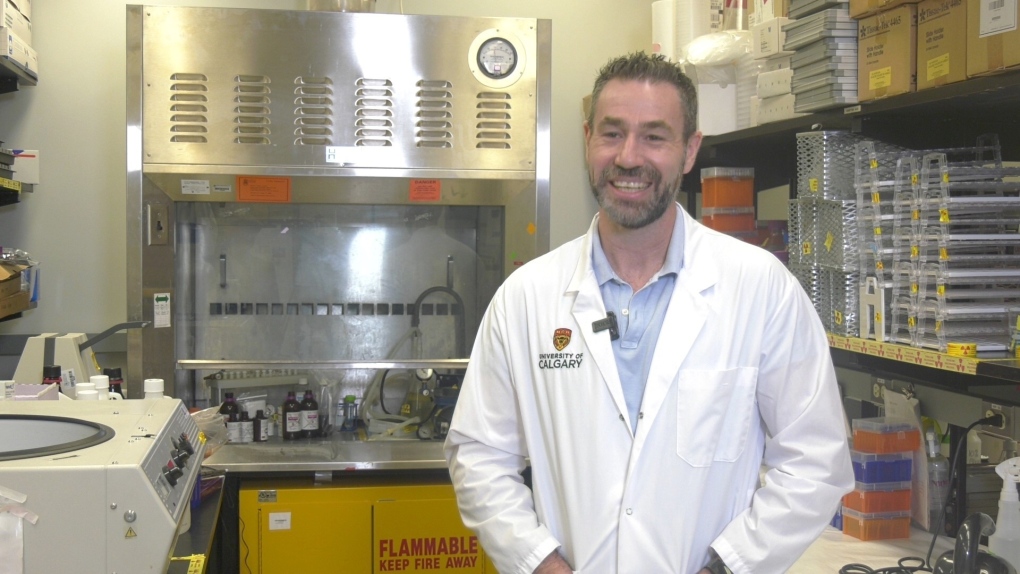Mental Health Initiative for Stress and Trauma launching in aftermath of Calgarian's tragic death
A new research chair at the University of Calgary Cumming School of Medicine and the Hotchkiss Brain Institute will examine how stress and trauma impact the brain, and ultimately an individual’s mental health.
The Mental Health Initiative for Stress and Trauma (MIST) will be led by Dr. Matthew Hill.
“The research purpose is to further our understanding of the effects of stress on the brain and how this relates to the development of mental health issues such as anxiety, depression, or post-traumatic stress disorder,” Hill said.
“The other research arm of the MIST chair is really to try and understand the intersection of how concussion and head trauma can influence the way that our brain processes stress and emotional states, to look at the relationship that we know exists between head trauma and the development of mental health conditions.”
Over the past two decades, Hill has researched the neurobiology of stress, and how it relates to psychiatric illness.
For the past 11 years, his lab has been working to better understand how stress hormones modify brain function, behaviour and metabolism.
“It's very well-established that, certainly in individuals that have undergone head trauma and, say, repetitive injuries from sports, or in the context of veterans, where they've had traumas from deployment, that there is a much greater incidence of mental health conditions in those individuals than there is in the general population,” Hill said.
“That does suggest that there is some causative role that exists for concussion and head trauma in the subsequent development of mental illness.”
 The Mental Health Initiative for Stress and Trauma (MIST) will be led by Dr. Matthew Hill.
The Mental Health Initiative for Stress and Trauma (MIST) will be led by Dr. Matthew Hill.
MIST was formed after the tragic death of Mike McClay, a father of two, who died by suicide in October 2021.
Two years earlier, McClay suffered a concussion after falling from a ladder.
That physical trauma, combined with other stressors, may have played a role in his death.
“Our friend, Mike, was not a person who was a quitter – not a person who gave up,” said McClay’s friend Trevor Johnson.
“This guy was a winner. And we were just dumbfounded by the news that he had been in such a state that he chose to take his own life.”
In an effort to understand his death, and help prevent other families from experiencing similar losses, McClay’s family and friends turned to UCalgary to search for answers, and eventually raised more than $300,000 to develop the MIST chair.
“This is an issue that affects a lot of people, in males, females, people of different ages. It's family members, friends and the workforce. So, it's got a broad level of effect on the entire community,” Johnson said.
“Maybe there's something that can be done, you know, we could help answer questions, and also help prevent other people from suffering the way that our friend was, and then hopefully, ultimately, prevent someone from making the choice to take their own life.”
 MIST was formed after the tragic death of Mike McClay, a father of two, who died by suicide in October 2021.
MIST was formed after the tragic death of Mike McClay, a father of two, who died by suicide in October 2021.
Unchecked, brain trauma can lead to the development of psychiatric conditions.
UCalgary researchers have intensified their focus on traumatic brain injuries, like concussions, in an attempt to see how they affect a person’s ability to process emotional stress.
“Another component of this as well, is to also educate the public on understanding that there is a relationship that exists between concussion and head trauma and the subsequent development of mental health issues,” Hill said.
“That's one of the key questions that we're looking at – trying to understand if there is a mechanism that can link the relationship that currently exists between concussion head trauma and mental health issues.”
A major focus of Hill’s research is on the endocannabinoid system – the system THC, which is the psychoactive component of cannabis, affects.
The human body also produces its own chemicals that stimulate the endocannabinoid system as a response to stress.
Hill’s research shows some stress-related psychiatric disorders seem to be associated with impaired endocannabinoid function.
“We know that some individuals are more vulnerable to the effects of stress, and have this ability to kind of stay locked in a stress state long after the experience that was stressful has passed,” Hill said.
“Part of what we think might be causing that is, that in some individuals, they have impaired endocannabinoid functions, so they don't maintain appropriate endocannabinoid response to calm the brain back down.”
Hill is also collaborating the head of the Parker Psychedelic Research Chair, Dr. Leah Mayo, who is researching ways to boost endocannabinoid levels to treat PTSD.
Hill and Mayo have undertaken clinical trials examining the efficacy of new treatments.
McClay’s family and friends continue to raise money to fund MIST, aiming to hit the $10-million mark.
Donations can be made online through the UCalgary Engage website.
In Canada, 4,500 people (12 people a day) die by suicide.
If your life or someone else’s is in danger, call 911 for emergency services, Distress Centre Calgary at 403-266-4357 or the Canada Suicide Prevention Service at 1-833-456-4566.
CTVNews.ca Top Stories

Alleged gang member driving from U.S. arrested at Canadian border after making wrong turn
An alleged gang member coming from the United States was arrested at the Canadian border after reportedly making a wrong turn onto the Peace Bridge border crossing.
Negotiations between Canada Post, union still on hold
Canada Post says it's waiting for a response from the union representing some 55,000 striking workers after it offered a new framework for negotiations over the weekend.
Trump demands immediate release of Oct. 7 hostages, says otherwise there will be 'HELL TO PAY'
President-elect Donald Trump is demanding the immediate release of the Israeli hostages still being held in Gaza, saying that if they are not freed before he is sworn into office there will be “HELL TO PAY."
Kingston, Ont. doctor ordered to repay $600K for pandemic vaccination payments
An Ontario health tribunal has ordered a Kingston, Ont. doctor to repay over $600,000 to the Ontario government for improperly billing thousands of COVID-19 vaccinations at the height of the pandemic.
Nova Scotia lawyer suspended following ugly courtroom fracas
A Nova Scotia lawyer who had to be restrained by deputy sheriffs during a court appearance earlier this year has lost his appeal of a suspension following the bizarre incident.
After multiple data breaches, Yahoo settled a class-action lawsuit. The deadline to file compensation claims is approaching
Yahoo and Rogers customers in Canada have until the end of the month to claim up to $375 cash from a data breach settlement.
AC/DC announces North American stadium tour, Vancouver lone Canadian stop
Big news for AC/DC fans as the heavy metal bigwigs announced Mondat they will hit the road next spring. But as of now, there’s only one Canadian show on the docket.
Wind chills of -50, snowfall of up to 50 cm: Canada's weather forecast
As the second day of December unfolds, Canadians from coast to coast are experiencing a range of wintry conditions. Here's what's happening in different parts of the country.
Neighbours who sheared tops of B.C. man's bamboo plants ordered to pay $1K in damages
A B.C. man whose neighbours lopped the tops off of four of his bamboo plants has been awarded $1,000 in damages by the province’s Civil Resolution Tribunal.































